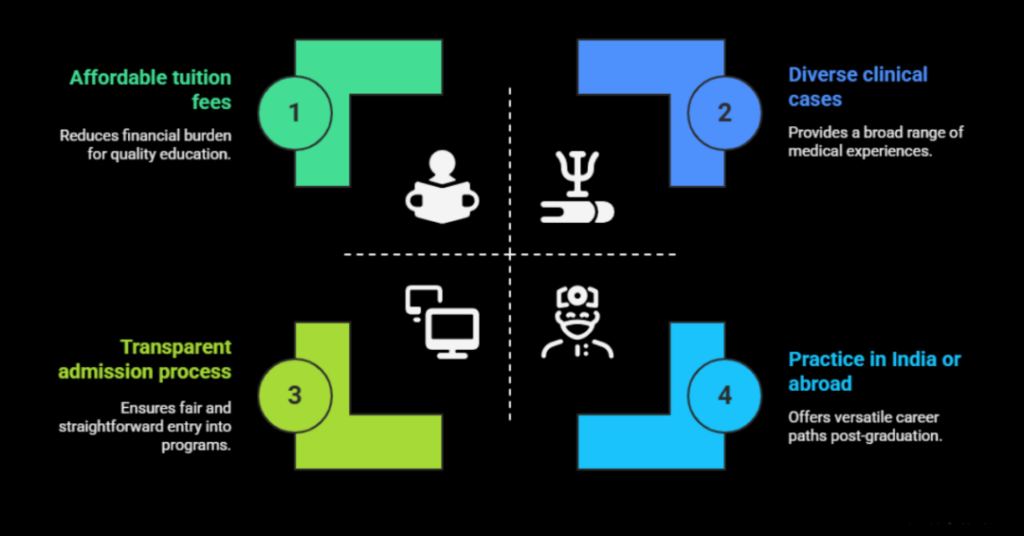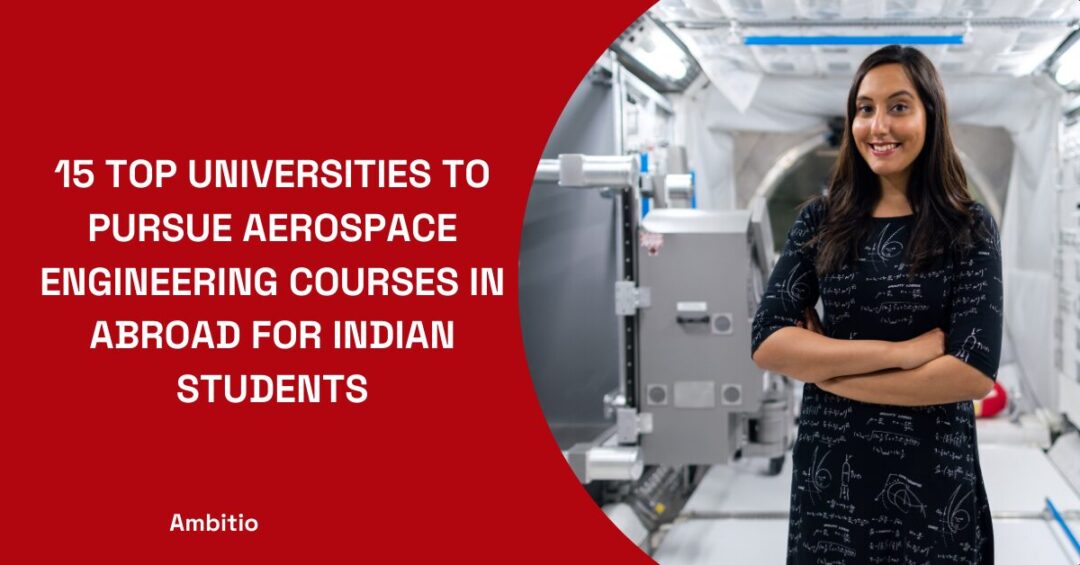11 September 2025
5 minutes read
What Are The Advantages And Disadvantages Of Studying MBBS Abroad For Indian Students In 2025?

Key Takeaways
- Only 1 lakh MBBS seats exist in India against 18 lakh aspirants, making private colleges costly at up to ₹1 crore.
- Studying MBBS abroad costs ₹25–40 lakhs on average, with more seats and earlier clinical exposure.
- Nearly 75% of Indian students returning from abroad fail FMGE, showing why exam prep is non-negotiable.
Every year, I meet families who walk in with NEET scores of 350 or 400 and hope for a government MBBS seat. If you look at it broadly, with over 18 lakh students competing for just 1 lakh seats, most don’t stand a chance.
Private medical colleges in India then become the “option,” but when I tell them the MBBS fees can cross 80 lakhs, I see the same reaction “, disbelief”. That’s exactly why thousands of Indian students end up looking at universities abroad every year.
So, now the question is: What are the advantages and disadvantages of studying MBBS in foreign countries? What is best for you? What cost might you incur? I have answered it all in this blog.
What Are The Advantages Of Studying MBBS Abroad For Indian Students?
I’ve seen families sell land to pay private medical colleges in India, only to realize an MBBS degree from universities abroad could have cost less and given better exposure.

About the benefits, there are many. I could write a book on this, but here are the five real advantages of studying MBBS abroad that matter.
1. More Seats, Less Chaos
In India, 18 lakh aspirants fight for 1 lakh MBBS seats, as I already mentioned above. Many end up in private medical colleges with insane MBBS fees. Universities abroad offer structured MBBS programs with more seats for international students. For those who pursue MBBS abroad, the admission process is simple and transparent.
2. Affordable MBBS With Quality
Families in India often spend over 80 lakhs on one MBBS seat. Studying MBBS abroad can cost 25 to 40 lakhs, depending on the country. This is one of the strongest advantages of studying MBBS abroad when compared to private medical colleges in India.
3. Global Clinical Exposure
Studying medicine abroad allows students to train in healthcare systems far more advanced than what many Indian hospitals provide. International students see diverse cases, modern facilities, and advanced treatments. This experience becomes an edge when they practice in India later.
4. Direct Entry Without Donation
To pursue MBBS abroad, students only need merit and NEET qualification. No capitation, no hidden MBBS fees. Colleges abroad offer admissions that are clean, unlike private medical colleges in India.
5. Career Flexibility
A foreign MBBS degree gives students options. They can practice medicine in India after clearing NEXT or continue studying medicine abroad. MBBS abroad offers mobility and career security that MBBS in India often limits.
What Are The Disadvantages Of Studying MBBS Abroad?
I won’t say MBBS abroad is the best option for everyone. Come on, everything has two sides. If you see what the 2023 NMC report says, more than 70 percent of Indian students who returned with a foreign MBBS degree could not clear the screening test in India.

Numbers like this show why students planning to study MBBS abroad must look beyond brochures.
1. Low Success Rate in Licensing Exams
Studying MBBS abroad has become common, but Indian students need to understand the numbers. The pass rate for the FMGE (soon replaced by NEXT) has often stayed below 25 percent. That means 3 out of 4 students who complete their MBBS studies abroad may fail to practice in India. For anyone pursuing an MBBS abroad, this is not just a statistic—it is career risk.
2. Hidden Cost of Studying MBBS
MBBS abroad at low cost looks attractive on websites. But the real cost of studying MBBS includes living expenses, exam prep, and travel. For example, the cost of studying MBBS in Uzbekistan is advertised at 20–25 lakhs, but with six years of stay, it can easily touch 35–40 lakhs. Indian students seeking an affordable MBBS fee structure must calculate total cost, not just tuition.
3. Quality Gap in Abroad Universities
Many universities abroad offer MBBS in English, but not all maintain strong clinical training. A WHO database shows that while several advantages exist in countries like Russia or the Philippines, smaller colleges in Eastern Europe often lack hospital tie-ups. Universities abroad are recognized differently in every country, so students to study MBBS abroad may end up in programs that do not prepare them for real-world practice.
4. Language and Cultural Barriers
Indian students already studying medicine abroad often complain about the the language. Abroad may be offered MBBS in English, but in hospitals, professors and patients shift to local languages. This makes it hard for students pursuing an MBBS degree abroad to interact with patients or learn bedside skills. These issues rarely show up in glossy admission brochures, but they are among the major cons of studying MBBS abroad.
What To Choose: MBBS Abroad Or MBBS In India?
Now everything narrows down to this: what to choose, MBBS abroad or MBBS in India. Students must look at the big picture, not just the admission letter. Among Indian students, the debate is constant, but the answer is never one-size-fits-all.
For students who wish to pursue medicine, the decision depends on cost, recognition, long-term goals, and where they see themselves practicing after completing their MBBS degree.
| Factor | MBBS in India | MBBS Abroad |
|---|---|---|
| Eligibility | High NEET score needed, especially for government colleges | NEET qualified is enough, even with a low score |
| Admission Process | Highly competitive with limited government seats | Easier entry, no donation, direct admission in many universities |
| Total Cost | ₹10 lakhs to ₹1 crore depending on government vs private | ₹20 lakhs to ₹60 lakhs depending on the country |
| Seat Availability | Extremely limited, especially in top colleges | Ample seats available across many countries |
| Teaching Language | English, but changes by state | Mostly English-taught programs |
| Clinical Exposure | Usually starts in 3rd or 4th year | Starts earlier, from 2nd year in many abroad universities |
| Licensing Exams | No FMGE, but NExT mandatory for all from 2027 | FMGE required till NExT applies in India |
| Cultural Environment | Familiar home setting, no adjustment issues | Requires adaptation to culture, climate, and lifestyle |
| Recognition & Licensing | Automatically recognized by NMC | Only valid if NMC-approved and after FMGE/NExT |
| Post-MBBS Path | NEET PG or NExT for postgraduate seats in India | FMGE + Internship + NEET PG/NExT or foreign PG options |
What Is The Cost Of Studying MBBS In Abroad?
After spending 2 hours in a Starbucks doing research, I have curated a list that finally answers the big question: what is the cost of studying MBBS in abroad. Students may think only about tuition when they plan to study abroad, but the truth is accommodation, lifestyle, and other expenses add up quickly.
Many Indian students ignore these hidden costs, only to realize later that the total budget is much higher than what consultants promise.
| Country | Tuition Fees (per year) | Accommodation (per year) | Lifestyle (Food, Travel, Utilities) | Other Expenses (Visa, Insurance, Books) |
|---|---|---|---|---|
| Russia | ₹3–5 lakhs | ₹1–1.5 lakhs | ₹1–1.5 lakhs | ₹50,000–₹1 lakh |
| Uzbekistan | ₹2.5–4 lakhs | ₹80,000–₹1.2 lakhs | ₹1–1.2 lakhs | ₹50,000–₹80,000 |
| Kazakhstan | ₹3–4.5 lakhs | ₹1–1.5 lakhs | ₹1–1.5 lakhs | ₹60,000–₹1 lakh |
| Philippines | ₹3.5–6 lakhs | ₹1.5–2 lakhs | ₹1.5–2 lakhs | ₹70,000–₹1.2 lakhs |
| Georgia | ₹4–6 lakhs | ₹1.5–2 lakhs | ₹1.5–2 lakhs | ₹80,000–₹1.2 lakhs |
| Kyrgyzstan | ₹2.5–3.5 lakhs | ₹80,000–₹1.2 lakhs | ₹1–1.2 lakhs | ₹50,000–₹80,000 |
| Bangladesh | ₹4–6 lakhs | ₹1–1.5 lakhs | ₹1.5–2 lakhs | ₹70,000–₹1 lakh |
| Nepal | ₹5–7 lakhs | ₹1–1.5 lakhs | ₹1.2–1.5 lakhs | ₹60,000–₹1 lakh |
| China | ₹3–6 lakhs | ₹1.5–2 lakhs | ₹1.5–2 lakhs | ₹80,000–₹1.2 lakhs |
Conclusion
If you strip away the glossy brochures, the real choice is between scarcity and risk. In India, 18 lakh aspirants fight for 1 lakh MBBS seats, pushing families toward private colleges that charge up to ₹1 crore. Abroad, the cost drops to ₹25–40 lakhs with earlier clinical exposure and more seats, but 3 out of 4 Indian students still fail the FMGE.
I know you still have questions, doubts, and maybe even confusion about which scholarships are right for you. That’s exactly where we can help. At Ambitio, our experts work one-on-one with students to map the right path, shortlist the best scholarships, and guide you through every step of the process. Book a 1-Hour call with our expert for No-Money.
FAQs
What are the eligibility criteria for studying MBBS abroad?
Students must be at least 17 years old by December 31 of the admission year, have completed 10+2 with Physics, Chemistry, Biology, and English, and have a minimum of 50% marks in PCB (40% for reserved categories). Qualifying NEET is mandatory for Indians who wish to practice medicine in India.
Is qualifying NEET mandatory for MBBS abroad admissions?
Yes, all Indian students seeking MBBS abroad must qualify NEET to ensure their degree is recognized for medical practice in India.
Which countries are considered best for MBBS programs abroad?
Popular countries include Russia, Ukraine, Georgia, Romania, Serbia, Poland, and Uzbekistan due to affordable fees, recognized universities, and English-based instruction.
What is the total cost of studying MBBS abroad, including hidden charges?
Costs vary widely (typically ₹20–60 lakh overall), including tuition, accommodation, living expenses, insurance, visa fees, and travel. Some countries may have scholarship options or lower cost-of-living
How long does an MBBS degree abroad typically take to complete?
Most international programs require 5–6 years, including a mandatory 1-year internship for hands-on clinical exposure.
Is the medium of instruction English, and do I need to learn a local language?
Many universities offer MBBS in English, but basic local language is often needed for clinical practice or internships.

You can study at top universities worldwide!
Get expert tips and tricks to get into top universities with a free expert session.
Book Your Free 30-Minute Session Now! Book a call now




























